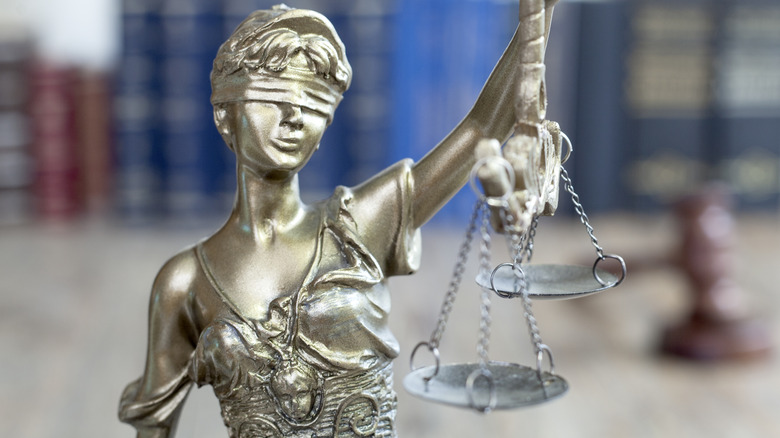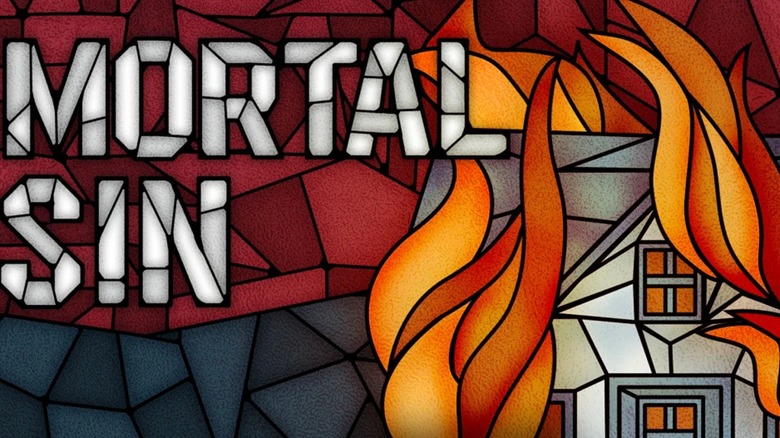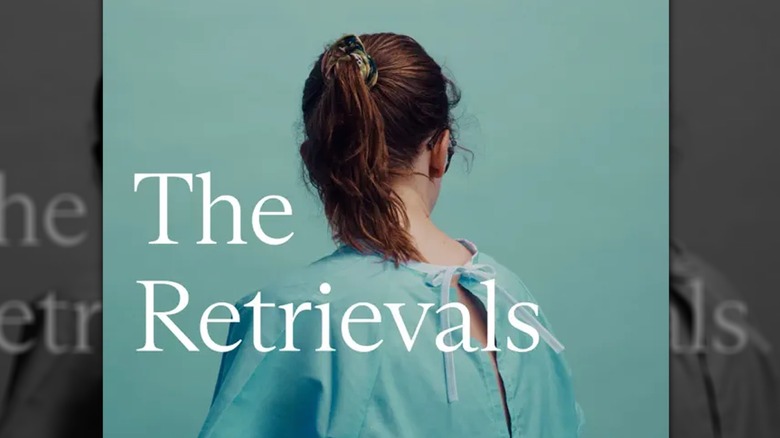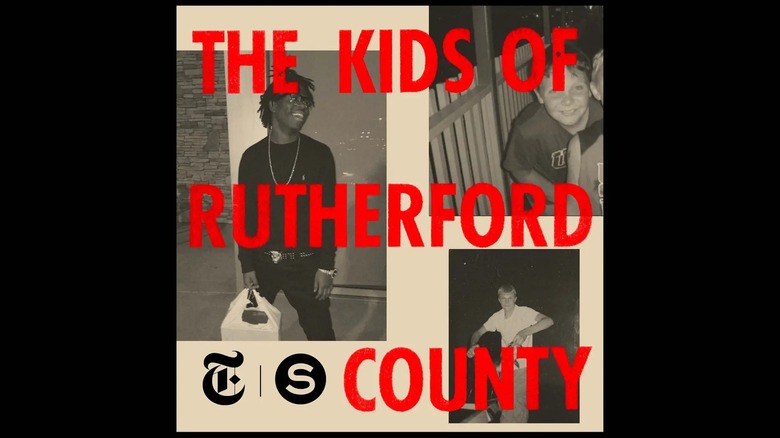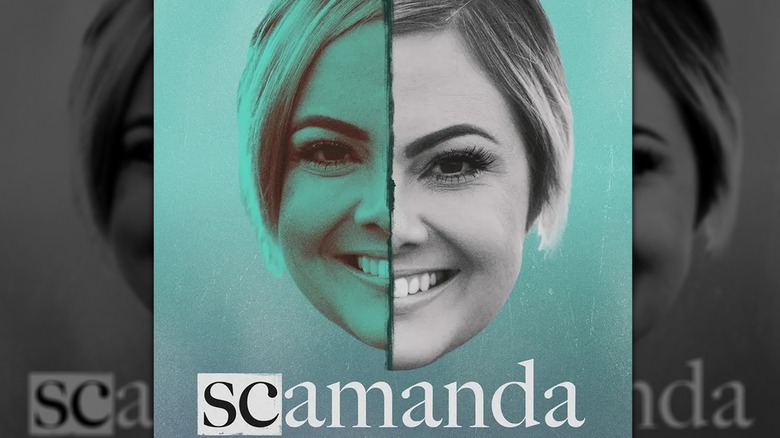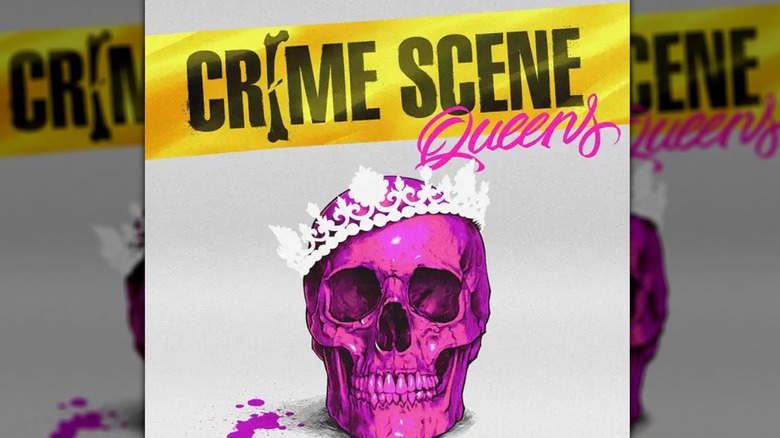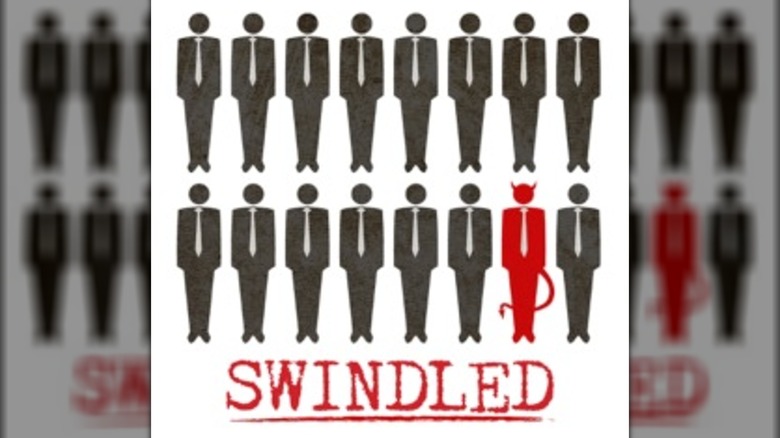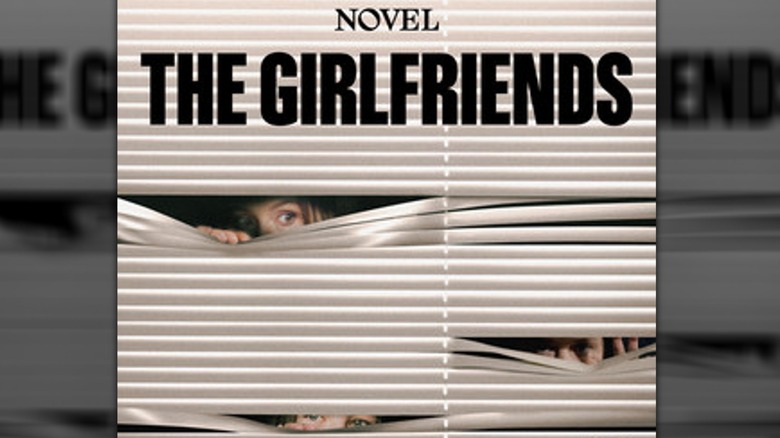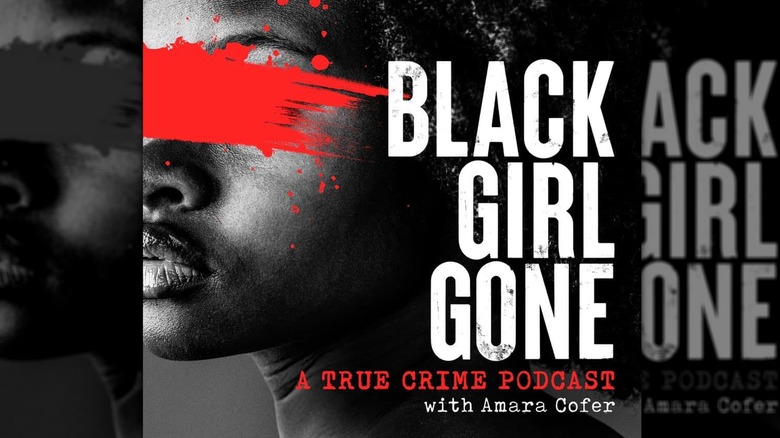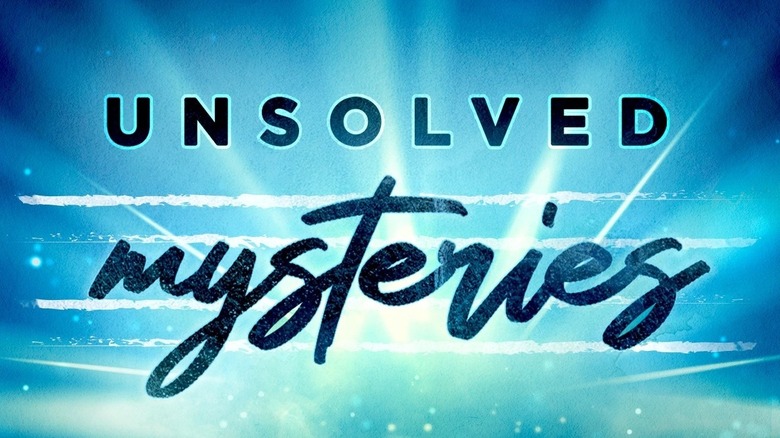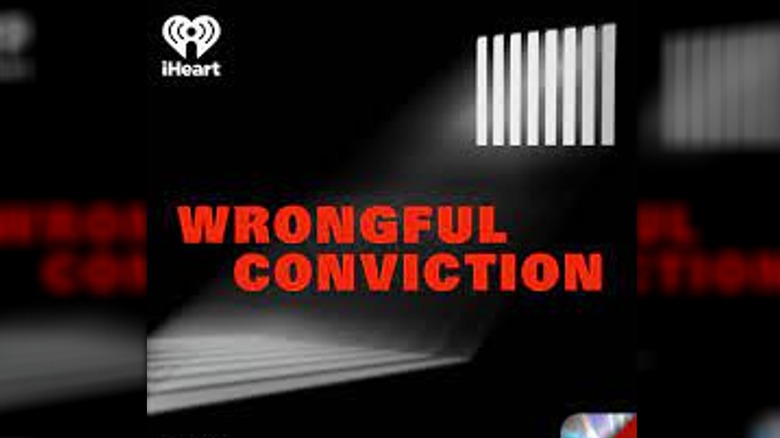12 Of The Best True Crime Podcasts Of 2023, Ranked
There are approximately a million and one true crimes podcasts out there ... we counted, and honestly, that's only a slight exaggeration. It's no secret that the true crime genre has taken off in a big way, and that can make finding one that's worth investing in a challenge and a half. Scroll through any listening platform, and it's clear that random choice plays a large role. It doesn't have to: We're going to take a look at some of the best true crime podcasts of 2023, and as if that wasn't enough help in deciding which to listen to next, we're also going to rank them.
How are we going to do that? In a few ways. In addition to cherry-picking podcasts that various media outlets have already recognized for their journalistic integrity and thorough research, we're also going to be looking at what listeners have not only made popular, but will likely find most useful. And that, after all, is why many people get so invested in true crime documentaries and podcasts: Insight.
When University of Amsterdam professor and social psychology researcher Suzanne Oosterwijk took a look at why people are so fascinated by the dark side of human nature, she found (via Sky News) something fascinating: "People may explore stimuli that portray death, violence, or harm because it gives them handholds that are useful in dealing with future negative situations." That said, let's take a look at the year's best true crime podcasts ... they might just teach you something.
12. Mortal Sin
Let's get things started with Dateline NBC's Mortal Sin ... and a disclaimer. All these podcasts are good, but this one comes in at the bottom of the ranking simply because it's more of a standard whodunit than some of the others we're going to feature. That said, it's solid: It's hosted by Josh Mankiewicz, and when it dropped at the end of 2023, it was expected to be another hit in a long line of hits that made Dateline's podcasts among the most successful of the genre.
So, what's it about? Mankiewicz summed it up to Deadline like this: "It's a story about trust, about betrayal, about truly crazy things that happen in the name of religion, and ultimately about murder. While you're listening, you will say several times to yourself, 'That can't actually have happened.' Except ... it did."
Without giving too much away, it's the story of a youth pastor and marriage counselor named Nick Hacheney. In 1997, he seemed to have suffered his own catastrophic loss when his wife, Dawn, was apparently killed in an accidental house fire. Was she? That, of course, isn't the end of the story, and things started looking suspicious when he claimed that the propane canisters investigators found in their bedroom had actually been Christmas gifts. The story that unfolds is a strange one, and given that there have been more than a billion downloads of Dateline's podcasts, it's a safe choice for some solid true-crime entertainment.
11. The Retrievals
The desire to belong to a loving, nurturing family is one of the most basic of human nature, and for many, that involves starting a family of their own. When it doesn't happen right away, the emotional toll can be devastating. The Pew Research Center says that around half of America's college-educated adults have either gone through some kind of fertility treatment or know someone who has, and that makes "The Retrievals" — a joint podcast between The New York Times and Serial Productions — an incredibly important listen.
The gist is this: Women who went to the Yale Fertility Clinic in hopes of conceiving a child began to report excruciating pain. Screams echoed through the clinic, and for some women, that pain lasted for days after their egg retrieval procedures. Those who called and reported it were often brushed aside ... and it wasn't until later that it was discovered that a nurse had been replacing the pain-killing fentanyl solution with saline, leaving countless women to go through invasive surgical procedures on their own.
There are a lot of layers to this one: There's medical malpractice, the consequences of the opioid epidemic, the way the medical community gaslights women who report pain, illness, and side effects, and the fight for accountability in the medical community. Podcast host Susan Burton told The Irish Times: "First, the women's pain was dismissed. And now the repercussions were trivialized, too. It's an act of erasure. To be told that the only part of a story that matters is the end."
10. The Kids of Rutherford County
Is this a hard listen? Absolutely, but is it an important listen for anyone with young or teenage children? Again: Absolutely. "The Kids of Rutherford County" is another offering from The New York Times and Serial Productions, and it also involves Nashville Public Radio and a Peabody Award-winning, Pulitzer Prize-finalist host in Meribah Knight. Juvenile justice is Knight's specialty, and what she uncovers in this podcast isn't just horrifying, it's a terrible reminder that there are still shocking, modern-day miscarriages of justice.
It starts with one case in particular, which saw a group of 11 Black schoolchildren who were arrested and shoved into the juvenile justice system. Why? They failed to stop a fight between other children. As if that isn't bad enough, the age range of the children started at 8.
That was in 2016, and when ProPublica's Legal Reporting Network kicked off, a deep dive into just what was going on behind the closed doors of juvenile courts was, well, to say it was shocking is a massive understatement. It wasn't just 11 children who were impacted by their arrests, and although it's unclear just how many kids fell victim to a powerful law enforcement officer appointed by an even more powerful judge, estimates range from at least in the hundreds to perhaps into the thousands. How did this happen in modern-day America?
9. Scamanda
The only reason this doesn't rank higher on our list is that we're all pretty aware of the fact that what's posted on social media just can't be trusted. There are filters, selective shots, photoshop, AI ... and then, there's Amanda Riley. At a glance, her blog seemed like one of those inspirational, strength-of-the-human-spirit sort of things, and let's be honest: Everyone loves to cheer on someone who's not only facing a diagnosis of cancer, but detailing the entire process in a way that's raw, candid, and helps others feel not-so-alone. But was there more to the story? Of course, and it started with journalist Nancy Moscatiello getting a tip that maybe, just maybe, Riley wasn't telling the whole truth.
Even as she raked in tens of thousands of dollars in donations, and wrote in incredible detail about the ups and downs, the good days and the bad days, the details didn't add up: She gave birth twice, traveled the country, and seemed to be suffering from few of the side effects that typically go along with cancer.
That's the story of the podcast "Scamanda," and it's a pretty enlightening listen for a number of reasons. Moscatiello — who lost her sister to cancer — perhaps summed it up best (via the Huffington Post): "It is infuriating to see a perfectly healthy person take on the plight of true warriors of cancer for financial gain and attention." What happened? How did the legal battle play out? It's worth listening to find out.
8. Crime Scene Queens
There are a ton of true crime podcasts out there that recount some of the world's most bizarre, most gruesome crimes and mysteries — solved and unsolved. Any podcast that broadens those horizons and adds a whole new dimension to that is a win, so let's talk about "Crime Scene Queens." The queens in question are Laura Zinn, a former nurse and current professor of crime scene investigation, and Shelly Haight, a part-time crime scene investigation professor, paralegal, and expert in forensic evidence. They're not precisely talking about crimes and the specific motives that criminals might have, but what happens on the other side.
It's not surprising that "Crime Scene Queens" is sitting at a respectable 4.8 stars on Spotify: Although they went on a temporary hiatus in 2023, new listeners can head back through old episodes for some fascinating insight into what really goes on when authorities start investigating. They talk about everything from analyzing blood spray to women's contributions to forensic science, crime scene contamination, how evidence is collected and preserved, and how photos are taken. Neat, right?
It's also surprisingly important. They're working to overcome what's called the CSI effect, which is basically misinformation spread by shows like CSI. According to a study done by the National Institute of Justice, the CSI effect isn't just real, but it has the potential to lead to wrongful convictions or acquittals ordered by jurors who have unreasonable or incorrect preconceived notions about what happens in crime scene investigations. The real deal? It's important.
7. Swindled
"Swindled" has been going for a good, long time: Seven seasons in, and it's still sitting at a comfortable 4.8/5-star rating on both Spotify and Apple. Reviews on Podbay are pretty consistently off-the-charts, and that's both surprising and not surprising at the same time. On one hand, it's absolutely not the sort of true crime most people are probably thinking of. There's no murder here — or at least, not much — and instead, it's a look at white-collar crime, stories of shady corporations, greed, Ponzi schemes, and cons.
And that's what's great about there being so many episodes for newcomers to work their way through: It's both a refreshing change of pace, and there are some incredibly important lessons here for anyone living in a world where anyone and everyone could be out to get you. (Spoiler alert: That's all of us.)
Hosted by an anonymous person who simply refers to themselves as "A Concerned Citizen," it's an eye-opening look into just how many schemes and swindles are out there, with unscrupulous individuals just looking for the next mark. Episodes are varied, and 2023's stories include pieces on the infamous Balloon Boy (the 6-year-old who supposedly took a ride through the sky thanks to science gone wrong), the uncomfortable facts of keeping killer whales in captivity, all in the name of corporate greed, and what happens when tragedy strikes a corporation — in this case, Imperial Food Products — that's been cutting corners on safety.
6. The Girlfriends
High ratings on streaming platforms are definitely one way of telling that a podcast has what it takes to stand out from the rest of the pack, but even bigger and better than that is when a bidding war starts on the rights to turn it into a television series. That's what happened at the end of 2023 for the podcast "The Girlfriends," and the winner was A24 and showrunner Michael Showalter.
So, what's it about? At a glance, it's pretty straightforward: Back in 1999, police charged a plastic surgeon named Robert Bierenbaum with the 1985 murder of his wife. The case was a little non-traditional, because there was a major problem: There was no body. The New York Times covered the case extensively, and reported that even at the time of his arrest, law enforcement suspected that he had used his private plane to dispose of Gail Katz-Bierenbaum's remains in the Atlantic.
"The Girlfriends" is the incredible story of the women who dated Bierenbaum in the time between the murder (which he ultimately confessed to) and his conviction. The women featured in the podcast each felt as though there was something off about Bierenbaum and their relationship, and they talk about it with an honesty that's pretty important. The podcast was done in partnership with the international foundation No More, which works with victims of domestic and sexual violence. The Telegraph calls it "sensitive, not sensational," and it ends up being a brilliant look at the lives behind the headlines.
5. and 4. Women & Crime and Direct Appeal
For the sake of simplicity, let's put "Women & Crime" and "Direct Appeal" together. They're both hosted by the same duo, Dr. Amy Shlosberg and Dr. Meghan Sacks. Both hold Ph.D.s in the criminal field, both teach, and both research incredibly specific and incredibly important areas in the criminal justice world.
First, there's the highly-rated "Women & Crime," and let's be clear: It's about much more than just female offenders, although that's definitely part of it. They also look at issues like the uncomfortable world of grooming pre-teens to commit unspeakable acts, a rape survivor's decades-long quest for justice, what happens when someone is wrongfully identified by surveillance technology, and what happens when someone is targeted by online predators. Many topics dive into subject matter that could truthfully impact anyone, anywhere, anytime, and that makes it an incredibly important and potentially educational listen.
In "Direct Appeal," the two criminologists take a season-long look at an individual case. Season one put the spotlight on Melanie McGuire, who became the prime suspect when pieces of her husband started washing ashore in suitcases. Season two got underway in 2023, and looked at Ryan Widmer and the death of his wife, Sarah.
3. Black Girl Gone
Getting anyone on the internet to agree on anything is, well, just not going to happen ... generally. Check out the user reviews for the podcast "Black Girl Gone," though, and it pretty consistently earns at least a 4.7/5 stars. Apple. Spotify. Chartable. And so on, and so on. Hosted, created, and produced by Amara Cofer, this podcast focuses on the stories that all too often don't make headlines ... simply because the victims are Black women.
When Gabrielle Petito went missing, that's all the headlines were talking about: The relentless coverage helped bring to light a problem that was so significant it was even given a name by PBS anchor and journalist Gwen Ifill: "missing white woman syndrome."
And that's why this podcast is a must-listen. Each 30-minute episode tells the story of victims who are rarely featured in mainstream media simply because of the color of their skin. Many of these cases are currently unsolved, many are fairly recent, and in many cases, they're featured because the victim's families reach out and ask Cofer for help. In an interview with Help You Find Me, Cofer explained: "The reality is at this point the media will care about what we as the public care about, or what they think we care about. ... We have to do that for these women also. ... It might not be a story the media cares to cover, but you can care, and you can help bring awareness to the story."
2. Unsolved Mysteries
Now, let's get to the best of the best. These top two not only have the potential for longevity, but the potential to make a massive difference in the lives of countless people. And "Unsolved Mysteries" is the podcast version of a franchise that has done precisely that: Executive producer Terry Dunn Meurer told USA Today that the original series led to the closure of more than 260 cases. And the podcast is proving just as popular. As of this writing, it sits with a respectable 4.8 stars on Spotify, and it's no wonder: Not only are cases presented, but the podcast is a living, breathing thing in which listeners also get updates on developments in previous cases.
The host of the podcast is voice actor Steve French, and when he spoke with Comic Book about the gig, he confirmed that, yes, Robert Stack and the original incarnation inspired his own take on the podcast. "I loved the original TV show, ... It was a poignant viewing in my house growing up. I love Robert Stack's voice, he scared the hell out of me. I can still viscerally remember certain images from that show, and, of course, the theme song ... I would sit in front of the TV, rapt with attention at what I was seeing."
Dunn Meurer — who created the show in the first place — is still involved in the podcast, and French confirmed that it's allowed for carrying on the tradition of the original with new stories, new crimes, and new opportunities for listeners to truly make a difference.
1, Wrongful Conviction
The justice system is far from perfect, and here are some terrifying numbers: ABC News found that between 1989 and 2023, 3,287 people had been exonerated from wrongful convictions ... but not before spending around 29,100 years collectively behind bars. That's unthinkable — and it's what the podcast "Wrongful Conviction" aims to bring to light.
Each one of the stories told is an interview with someone who has been convicted of a crime they didn't commit. Some have seen an end to their ordeal, some have not. The host of the podcast, Jason Flom, has seen first-hand the devastating impact a wrongful conviction can have not on one life, but on entire families: After working at Atlantic Records and founding Lava Records, he became one of the founding board members of the Innocence Project, an organization that works with wrongfully convicted clients to get their convictions overturned.
And Flom has been doing it for a long, long time. He was featured by NPR around the podcast's 11th season (in 2020), and even as he was quoted as explaining how wrongful convictions "disrupts communities, and blows apart families, and leads to more incarceration," those he worked with had nothing but good things to say. Not only did they credit him with helping overturn convictions and raise awareness, but to help those impacted get back on their feet. And that? That's the sort of activism the world needs more of.
Our methodology
It's also no secret that rankings tend to come with a heavy dose of personal opinions, but we started somewhere else: With a look toward why everyone is so fascinated with true crime in the first place. Experts at the BBC and the University of Illinois at Urbana-Champaign say that one of the most fundamental reasons we're fascinated with the genre is because it gives ordinary people insight into the criminal mindset, and by extension, helps us to recognize patterns, identify dangerous behaviors, and potentially teach us ways to avoid becoming the victims we're listening about.
But there's a flip side to this, too. Whitney Phillips is a University of Oregon assistant professor of digital platforms and ethics, and says that the creation of true crime podcasts and documentaries brings with it the risks of trivializing and even dehumanizing victims, as well as focusing predominantly on a certain type of victim: usually white women, which overlooks entire demographics. And that? That's awful.
That said, the podcasts we considered for our ranking had to meet certain criteria to be considered among the best. In addition to taking into account user ratings on streaming platforms, as wells as suggestions and insight from Reddit forums, we also selected podcasts for their real-world impact: Whether that's teaching listeners something potentially relevant to their personal experiences, lifting the veil on a widespread yet often overlooked part of the world that has the potential to seep into everyday life, or presenting content that allows listeners to feel they've learned something. The wider the impact, the higher they're likely to fall in the ranking: Each one of our best podcasts will leave listeners wiser and more worldly than they were when they started listening.
